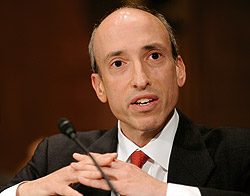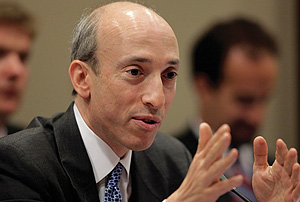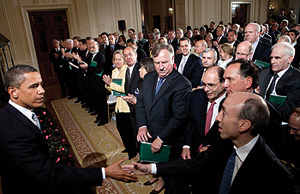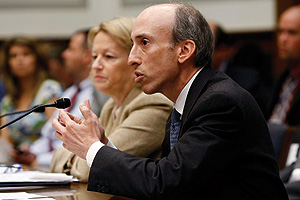Message from the Chairman

U.S. Commodity Futures Trading Commission Chairman Gary Gensler testifies on Capitol Hill in Washington, Monday, June 22, 2009, before the Senate Banking Committee hearing on over-the-counter derivatives. (AP Photo/Susan Walsh)
One year ago, the financial system and our financial regulatory system failed the American public. There were gaps in our regulatory structure that left the Nation unprepared and unable to respond quickly to changing market environments. The last 12 months have taught us much about the new realities of our financial markets. We have learned the limits of foresight and the need for candor about the risks we face. We have learned that transparency and accountability are essential. Only through strong, intelligent regulation—coupled with aggressive enforcement mechanisms—can we fully protect the American people and keep our economy strong.
The need for reform of our financial system today has many similarities to the situation facing the country in the 1930s. In 1934, President Roosevelt boldly proposed to the Congress “the enactment of legislation providing for the regulation by the Federal Government of the operation of exchanges dealing in securities and commodities for the protection of investors, for the safeguarding of values, and so far as it may be possible, for the elimination of unnecessary, unwise, and destructive speculation.” The Congress swiftly responded to the clear need for reform by enacting the Securities Act of 1933, the Securities Exchange Act of 1934 and the Commodity Exchange Act of 1936.
It is clear that we need the same type of comprehensive regulatory reform today. That is why the Obama Administration is working closely with the Congress to close the gaps in our laws to bring much-needed transparency and regulation to the over-the-counter (OTC) derivatives market to promote transparency, lower risks, strengthen market integrity and protect investors. This is vital for the future of our economy and the welfare of the American people.

Gary Gensler, chairman of the Commodity Futures Trading Commission, conducts a hearing on energy speculators and whether they influence fluctuations in the energy market that could affect the price of oil and natural gas in an adverse or destabilizing way, at the CFTC headquarters in Washington, Wednesday, Aug. 5, 2009. (AP Photo/J. Scott Applewhite)
The Commodity Futures Trading Commission’s (CFTC or Commission) mission is to protect market users and the public from fraud, manipulation and abusive practices related to the sale of commodity and financial futures and options, and to foster open, competitive and financially sound futures and options markets.
Specifically, the CFTC is working with Congress on comprehensive regulatory reform of the Dodd-Frank Act marketplace. Last year’s crisis highlighted all too well how opaque markets can threaten the financial system and the American public. There has neither been transparency to the public nor to the regulators in these markets. Only through addressing the lack of transparency can we reduce information deficits for regulators, market users, and the public. Further, we also are working with Congress on lowering risk to the system created by OTC derivative transactions by requiring standardized products to be centrally cleared. Lastly, we must ensure that entities that deal in derivatives are required to register and come under comprehensive regulation. This includes capital standards, margin requirements, business conduct standards and record-keeping and reporting requirements. The CFTC also should have the authority to set aggregate position limits in the Dodd-Frank Act marketplace.
While regulatory reforms are underway, the CFTC remains steadfast in using existing authorities to achieve our mission. As such, the CFTC is vigorously using every tool available to protect the American people from fraud, manipulation and other abuses.

U.S. President Barack Obama, left, shakes hands with Gary Gensler, chairman of the Commodity Futures Trading Commission, after making remarks on financial regulatory reform in the East Room of the White House in Washington, D.C., U.S., on Wednesday, June 17, 2009. Obama said his plan to refashion supervision of the U.S. financial system is needed to fix lapses in oversight and excessive risk taking that helped push the economy into a prolonged recession. (Photo by Brendan Smialowski/Bloomberg via Getty Images)
In the past few months, the CFTC has conducted a number of substantive public hearings and meetings on a number of critical initiatives. The Commission held three days of hearings into whether concentration position limits should be set in the energy futures markets similarly to how they are currently set in many agriculture markets. We continue to review public comments on this issue and seriously consider proposing a rule to set position limits in the energy markets.
The CFTC and the Securities and Exchange Commission (SEC) held unprecedented joint meetings on regulatory harmonization in September. The agencies jointly made 20 recommendations where we can change our statutes and regulations to enhance both agencies’ enforcement powers, strengthen market and intermediary oversight, and facilitate greater operational coordination. We are committed to working with the SEC to implement these recommendations and will work with Congress to secure necessary changes in statute to best protect the American public.
A core mission of the CFTC is to promote market transparency. As such, we have recently taken a number of initiatives to promote transparency in the futures markets. The Commission has for decades provided the public with weekly Commitments of Traders (COT) reports consisting of aggregated data on large-trader positions. Historically, the CFTC reported the trades of commercial entities and noncommercial entities. These data categorizations became less relevant as the markets continued to evolve. In September, the Commission began disaggregating swap dealers and managed money (i.e. hedge funds) to more accurately reflect the makeup of the American futures markets. This has given market participants, regulators and the public a better idea of who is participating in risk management markets. The CFTC also has begun releasing data on index investment in the commodity futures markets. This data informs market participants, regulators and the public about how much involvement index investors have in the derivatives markets. These two steps are part of an ongoing process of looking for ways to best improve transparency in the commodities markets.

Gary Gensler (R), chairman of the Commodity Futures Trading Commission, and Mary Schapiro (L), chairman of the Securities and Exchange Commission, testify before the House Financial Services Committee July 22, 2009 in Washington, DC. The full committee met to hear testimony on ‘Regulatory Perspectives on the Obama Administration’s Financial Regulatory Reform Proposals.’ (Photo by Win McNamee/Getty Images)
Our surveillance staff are keeping a close eye for signs of manipulation or congestion. In the past year, the Commission filed 50 enforcement actions and enforcement staff opened 251 investigations of potential violations of the Act and Commission regulations. Through these and existing cases previously filed by the Commission, the Commission imposed monetary penalties of more than $183 million in restitution and disgorgement and $97 million in civil monetary penalties.
The CFTC is highly engaged with our foreign partners. We have recently jointly signed a Memorandum of Understanding with the U.K. Financial Services Authority (FSA) to enhance cooperation and the exchange of information relating to the supervision of cross-border clearing organizations and strengthen cross-border supervision of energy futures markets. We also are working with our foreign partners to implement consistent regulatory reform of the Dodd-Frank Act marketplace.
As we begin the new fiscal year (FY), the Commission continues to be under-resourced. With about 580 staff, we have just now returned to our staffing levels 10 years ago. In the last decade, futures trading volume went up nearly five fold. The number of actively traded futures and options contracts went up seven fold, and many of these are considerably more complex in nature. We also moved from an environment with open-outcry pit trading to highly sophisticated electronic markets. What was once a group of regional domestic markets is now a global marketplace. I am pleased that Congress has given the CFTC a 16 percent budget increase for FY 2010. We are currently working with the Office of Management and Budget (OMB) and Congress to address the CFTC’s significant further resource needs in the 2011 budget.
For example, the Commission requires additional resources to replace legacy surveillance equipment with 21st Century computers. Significant changes in the markets demand new systems capable of efficiently receiving and managing massive amounts of raw data and converting it to useful market information for analysis by skilled market experts, economists and technologists. Should Congress enact regulatory reform of the Dodd-Frank Act markets, the CFTC would need additional resources to effectively monitor the markets.
In closing, in FY 2009, we received for the fifth consecutive year an unqualified opinion on our financial statements. As was the case for three consecutive years, the auditors disclosed no material instances of noncompliance with laws and regulations. I am also proud to report we had no material internal control weaknesses and that our financial and performance data in this report are reliable and complete under OMB’s guidance.
Gary Gensler
November 13, 2009



